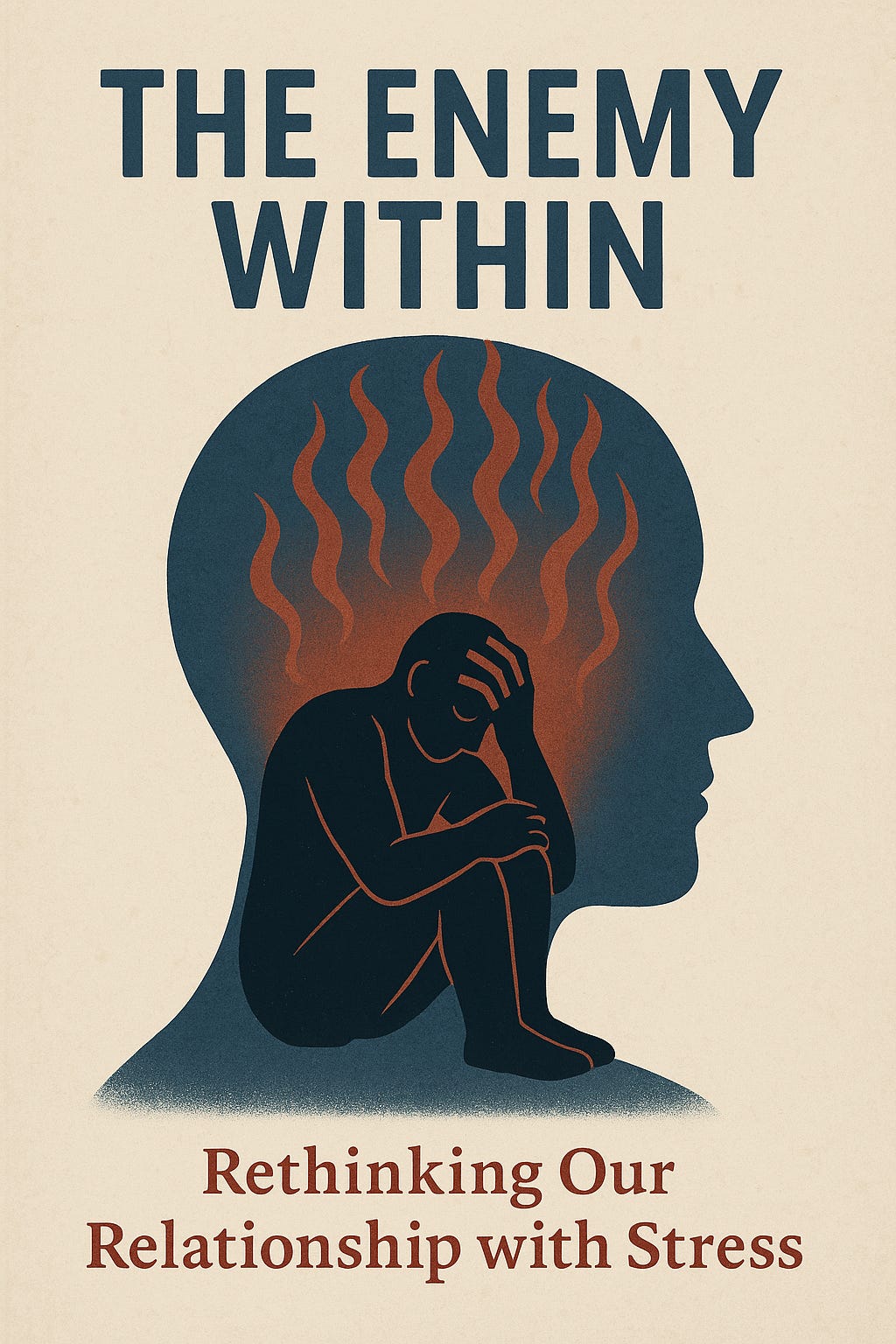The Enemy Within?
Rethinking our relationship with stress
When Normal Fell Apart
My heart was pounding, breath shallow, chest tight—familiar symptoms of panic overtaking my body as I sat in a cramped hospital room beside my teenage son's hospital bed.
Just a few days earlier, everything was normal, predictable, comfortable even. And then suddenly, my son collapsed with a life-threatening condition that threw our comfortable life into chaos.
In an instant, I was thrust into a reality where stress was no longer occasional—it became constant, overpowering, relentless.
I had always been the calm one, the voice of reason.
Now, I found myself lost in fear and anxiety, facing a reality I couldn't control.
I recall vividly the nights spent curled uncomfortably in a hospital chair, staring at the sterile white walls, overwhelmed by a sense of helplessness.
It was during one of those restless nights when a surprising realization struck me.
I was angry, frustrated, and most importantly, utterly consumed by stress. But did it have to be that way?
The Turning Point: Defining My Relationship with Stress
"Did you know you can actually choose to be pro-stress or anti-stress?" When I first asked my coaching clients this question months later, they looked at me as though I'd lost my mind.
But the truth was, this realization came to me at my most vulnerable moment—in that hospital room, as I faced uncertainty head-on. Until then, I'd always believed stress was something that happened to you, an external force you endured. But was it really so straightforward?
Curiosity took over. I dove into books and scientific studies, discovering fascinating insights into how our mindset profoundly shapes our experience of stress. Kelly McGonigal’s groundbreaking research, shared in her TED Talk “How to make stress your friend” and book “The Upside of Stress,” revealed something incredible: the belief that stress is harmful actually makes it harmful. On the flip side, believing that stress is helpful—something that boosts performance, resilience, and growth—completely changes its physiological impact.
This revelation blew my mind. McGonigal’s research highlights that when we perceive stress positively, our body responds in kind—releasing hormones like oxytocin, which promotes connection and courage. Conversely, seeing stress negatively floods our system with cortisol, weakening our immune response and amplifying fear. In short, our interpretation of stress determines its effect on us.
It hit me like a lightning bolt. My stress, I realized, wasn't a villain. It could become my ally, a powerful tool for growth, resilience, and strength. I had always preached resilience and adaptability to my clients, yet here I was, feeling trapped and powerless. What if I chose differently?
So, I began actively changing my narrative. Instead of telling myself I was overwhelmed, I started seeing each stressful moment as a challenge—an opportunity to grow, learn, and rise. Every doctor’s visit, every uncertainty, became an invitation for resilience. Slowly but surely, my relationship with stress shifted from adversarial to collaborative.
Transforming Crisis into Strength
My son's health journey was difficult, but by redefining my relationship with stress, I not only endured—I transformed. Each stressful encounter strengthened me, teaching me invaluable lessons about courage, patience, and compassion. My fear gave way to determination. Anxiety became curiosity. Stress, instead of destroying me, built me into a stronger, wiser version of myself.
In my coaching practice, this realization now forms the cornerstone of my approach. I passionately teach clients that they are not passive victims of stress; they are active participants. They have a say in the narrative. They can choose to embrace stress as something beneficial—a driver for action and personal evolution. Or, they can choose resistance and fear, perpetuating a cycle of anxiety and overwhelm.
The choice might sound simple, yet its implications are profound. One of my clients, an executive battling intense work stress, decided to experiment. Initially skeptical, he consciously reframed each stressor as an opportunity for growth rather than something detrimental. Weeks later, he reported feeling significantly more empowered, resilient, and engaged at work. He was astonished at how simply shifting his mindset altered his entire experience.
This transformation, scientifically backed and personally experienced, is accessible to everyone. Stress is inevitable; it’s our perception and response to it that determine its impact. Being pro-stress doesn't mean chasing chaos. It means embracing stress consciously, recognizing its potential to shape us positively.
Choosing Your Relationship with Stress
Here's the uncomfortable yet empowering truth: stress isn't going anywhere. Life guarantees stressful moments, from small annoyances to profound crises. But remember, you're not helpless. You get to decide how you experience stress.
The next time stress knocks on your door, pause and consciously choose your reaction. Ask yourself, will this moment break me, or will it build me? Remember Kelly McGonigal’s powerful insight—stress only harms if we believe it harmful.
I urge you to shift your mindset. Embrace stress as a powerful ally in your personal growth and resilience. Choose to become pro-stress, harnessing every challenging moment as fuel for your personal evolution.
For the next 24 hours, observe your stress response. Each time you feel stressed, pause and ask, 'Is this breaking me or building me?
👉 If you enjoy reading this post, feel free to share it with friends! Or feel free to click the ❤️ button on this post so more people can discover it on Substack



